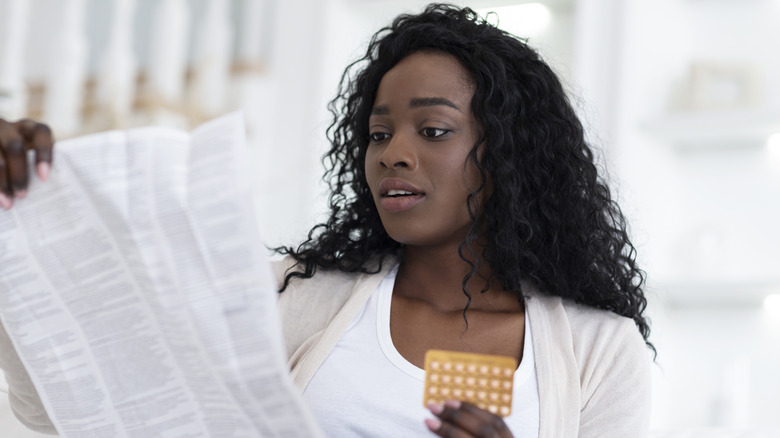Study Shows Birth Control Pills Can Still Be Effective Even With Far Fewer Hormones
Birth control options have expanded substantially over time. According to 2020 survey data from the Kaiser Family Foundation, women use approximately 3.4 different forms of birth control over the course of their life. Many different types of contraceptives contain hormones such as either estrogen, progestin, or both (via Healthline). These hormones can be found in birth control rings, patches, shots, implants, oral pills, and more.
While hormone-based birth control may be a good fit for some, others may be affected by various side effects. Such side effects may include bloating, tenderness in the breasts, weight changes, unwanted hair growth, or changes in mood. There are also some potential health risks associated with hormonal contraceptive use, such as increases in blood pressure or blood clots.
For reasons that are unique to each person, some people have looked to non-hormonal birth control alternatives. But might less potent hormonal birth control be a workable option? As it turns out, in a recent 2023 study published in PLOS Computational Biology, researchers analyzed the efficacy of birth control pills when hormone dosages were adjusted. The study findings showed that the pills were still effective even with a significant reduction in hormone levels.
Hormone reduction in estrogen-only and progesterone-only birth control
The study team examined health data from 23 women between the ages of 20 to 34 with regular periods cycling between 25 to 35 days (per Medical News Today). Researchers utilized a pituitary model and ovarian model to see how birth control pills with varying levels of estrogen and progesterone affected factors such as timing of hormone release, ovary response to hormone release, and menstruation.
The findings revealed that hormone levels in estrogen-based birth control pills could be reduced by as much as 92% and still be effective in preventing ovulation. Furthermore, hormone levels in progesterone-based pills were found to still be effective when reduced by 43%. "It was surprising that theoretically, our mathematical model — with the simplifying assumptions — showed that as low as 10% of the total exogenous estrogen dose in constant administration could achieve contraception as long as this dosage is perfectly timed," study author Brenda Gavina told Medical News Today.
Because the study was not conducted on humans, however, more research is still needed on the subject. Additionally, some experts point out that hormone dosages will likely need to be tailored to a patient's particular needs based on factors such as an individual's body mass index (BMI). Age, history of health conditions, and personal goals will also need to be factored in, notes Healthline.


